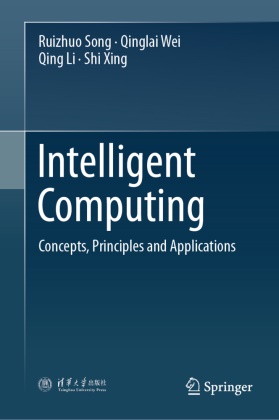Partager
Fr. 103.00
Qing Li, Qing et al Li, Ruizhuo Song, Qinglai Wei, Shi Xing
Intelligent Computing - Concepts, Principles and Applications
Anglais · Livre Relié
Paraît le 21.11.2025
Description
Intelligent computing is a computational approach primarily inspired by the objective laws governing biological groups in nature, as well as the behaviors of biological thinking and movement. It encompasses various algorithmic fields such as evolutionary computation, swarm intelligence computation, neural computation, and more. These algorithms typically achieve the goals of intelligent computing by simulating the distinctive functions of certain species in nature or specific characteristics of natural phenomena. By programming and executing the collective wisdom of biological groups and leveraging natural laws, optimization algorithms with intelligent essence are designed.
This book serves as an introduction to widely used and common intelligent computing methods. It covers fundamental concepts, principles, model characteristics, and typical application examples of various intelligent computing methods. Additionally, it provides the latest examples along with corresponding Matlab or Python codes, facilitating readers in deepening their understanding and reproducing the content. The target audience for this book includes senior undergraduate and graduate students majoring in automation, artificial intelligence, intelligent science and technology, computer science, and related fields. It can also serve as a valuable self-study reference for professionals in computer science, artificial intelligence, and related disciplines.
Table des matières
"Chapter 1: Introduction".- "Chapter 2: Evolutionary Computing".- "Chapter 3: Swarm Intelligence Computing".- "Chapter 4: Neural Computing".- "Chapter 5: Machine Learning".
A propos de l'auteur
Ruizhuo Song is a professor at School of Automation and Electrical Engineering, University of Science and Technology Beijing. She received the Ph.D. degree in control theory and control engineering from North-eastern University, Shenyang, China, in 2012. From 2013 to 2014, she was a Visiting Scholar with the Department of Electrical Engineering, University of Texas at Arlington, Arlington, TX, USA. From January 2018 to February 2018, she was a Visiting Scholar with the Department of Electrical, Computer, and Biomedical Engineering, University of Rhode Island, Kingston, RI, USA. She was a Post-Doctoral Fellow with the University of Science and Technology Beijing. She has authored or co-authored more than 100 journals and conference articles and co-authored 3 monographs. Her current research interests include intelligent perception and computing, optimal decision-making and gaming for virtual/real complex systems, and the results are applied to human body signal measurement and control, target positioning and recognition, energy internet, etc.
Qinglai Wei is currently a professor at the Institute of Automation, Chinese Academy of Sciences. He received the Ph.D. degree in control theory and control engineering, from the Northeastern University, Shenyang, China, in 2002 and 2009, respectively. From 2009--2011, he was a postdoctoral fellow with The State Key Laboratory of Management and Control for Complex Systems, Institute of Automation, Chinese Academy of Sciences. He has authored two books and published over 60 international journal papers. His research interests include adaptive dynamic programming, neural-networks-based control, optimal control, nonlinear systems and their industrial applications.
Qing Li received his B.S. degree from North China University of Science and Technology, Tangshan, China, in 1993 and his Ph.D. degree in control theory and its applications from the University of Science and Technology Beijing, Beijing, China, in 2000. He is currently a Professor with the School of Automation and Electrical Engineering, University of Science and Technology Beijing, Beijing, China. He has been a visiting scholar at Ryerson University, Toronto, Canada, from February 2006 to February 2007. His research interests include intelligent control and intelligent optimization.
Shi Xing received the Master's degree in Control Engineering from the University of Science and Technology Beijing, China, in 2015. Currently, he is a Ph.D. candidate in the field of Instrument Science and Technology at the same university. His current research interests mainly include multi-agent cooperative control, collaborative localization optimization of wireless sensor networks, and the application of research outcomes in the areas of sensor target positioning and recognition, etc.
Résumé
Intelligent computing is a computational approach primarily inspired by the objective laws governing biological groups in nature, as well as the behaviors of biological thinking and movement. It encompasses various algorithmic fields such as evolutionary computation, swarm intelligence computation, neural computation, and more. These algorithms typically achieve the goals of intelligent computing by simulating the distinctive functions of certain species in nature or specific characteristics of natural phenomena. By programming and executing the collective wisdom of biological groups and leveraging natural laws, optimization algorithms with intelligent essence are designed.
This book serves as an introduction to widely used and common intelligent computing methods. It covers fundamental concepts, principles, model characteristics, and typical application examples of various intelligent computing methods. Additionally, it provides the latest examples along with corresponding Matlab or Python codes, facilitating readers in deepening their understanding and reproducing the content. The target audience for this book includes senior undergraduate and graduate students majoring in automation, artificial intelligence, intelligent science and technology, computer science, and related fields. It can also serve as a valuable self-study reference for professionals in computer science, artificial intelligence, and related disciplines.
Détails du produit
| Auteurs | Qing Li, Qing et al Li, Ruizhuo Song, Qinglai Wei, Shi Xing |
| Edition | Springer, Berlin |
| Langues | Anglais |
| Format d'édition | Livre Relié |
| Sortie | 21.11.2025 |
| EAN | 9789819697892 |
| ISBN | 978-981-9697-89-2 |
| Pages | 168 |
| Illustrations | IV, 168 p. 94 illus., 38 illus. in color. |
| Catégories |
Sciences naturelles, médecine, informatique, technique
> Informatique, ordinateurs
> Informatique
Informatik, machine learning, Maschinelles Lernen, Artificial Intelligence, computer science, genetic algorithms, particle swarm optimization, neural computing, evolutionary computing, Swarm Intelligence Computing |
Commentaires des clients
Aucune analyse n'a été rédigée sur cet article pour le moment. Sois le premier à donner ton avis et aide les autres utilisateurs à prendre leur décision d'achat.
Écris un commentaire
Super ou nul ? Donne ton propre avis.

